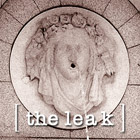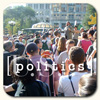
|
|
WHO KNEW ABOUT THE LEAK? 12 July 2005 Evidence arising out of the notes and testimony of reporters subpoenaed by Special Prosecutor Patrick Fitzgerald in his investigation of the outing of an undercover CIA agent by administration officials points to the involvement of Karl Rove, Bush's top political advisor. As the evidence mounts, the White House has now begun to refuse to answer questions about the matter. After Time magazine and Rove's lawyers confirmed that Rove did send e-mails obtained from reporter Matthew Cooper, Democrats began openly calling for Bush to fire Rove, in keeping with promises to rid his administration of anyone linked to the leak. Press Secretary Scott McClellan told the press today "Now is not the time to talk about it", but he promised as well that "We will talk about it once the investigation is complete". Republican lawmakers have allegedly begun telling the press a series of well-scripted explanations of the content of Rove's conversation(s) with Matthew Cooper. This is information that could only have come from Rove's office, and journalists in the White House Press Room report having been told the White House and the RNC had issued "guidance" and "talking points" on what to say about Rove's involvement in the leak. Strikingly, McClellan did not deny that such talking points had been issued, but only went as far as to say that he would not comment on anything related to the investigation. The question was, of course, not directly related to the investigation but rather to actions which would have taken place this morning or in recent days, and which would have to do with political damage control on the part of the administration. He nevertheless refused to answer. Democrats have also begun calling for the White House to at least revoke Karl Rove's security clearance, as his involvement in issues related to national security is now in question. The White House press secretary refused to answer any questions related to "news stories" or to the ongoing investigation. In September of 2003, McClellan was asked about a statement he had made saying "The president knows that Karl Rove wasn't involved". The reporter asked simply and directly: "How does he know that?" McClellan's response was that "If anyone in this administration was involved in it, they would no longer be in this administration". McClellan has explained in the past that his avowed denial of Rove's involvement was based on the president's claim that Rove had personally told him he was not involved, and so, trusting his long-time adviser, the president was able to assure his press secretary that Rove was not involved. In light of revelations that he in fact was involved, to whatever extent, McClellan was asked to explain whether Rove had apologized for the reported untruth; again, McClellan would not answer. In both of Mr. McClellan's September 2003 statements cited above, the fundamental question enters as to how to prove a negative without knowing all of the facts. This implies one of two very obvious scenarios must be true: either the president actually does know Rove wasn't involved because he knows every detail of the incident and oversaw the illegal leak personally, or the official position of the White House, from president down to press secretary, was that instinct alone is enough to carry out a full investigation, no evidence is needed; essentially, McClellan's statements suggest that either the top officials at the White House were directly involved, or they decided deliberately not to find out who was. An article in From The Wilderness from June 2004 outlines how the leak itself jeopardized national security concretely. It is also suggested that the resignation of George Tenet as director of the CIA may be a hint of direct involvement of top officials. True or not, the allegation stems directly from confounding and contradictory White House behavior with regard to the case. On 7 October 2003, Bush himself incredibly told the press "I don't think we'll ever know the source of the leak", again suggesting a lack of dedication to the very real and very grave issues of national security involved in the outing of an undercover CIA agent. It is somewhat shocking that the only source online which appears to note this statement is a partisan political blogsite, but the fact remains the White House has repeatedly hinted that it knows it is on the wrong side of this scandal. It is still not clear as of the writing of this article whether the special prosecutor has asked the fundamental question: Who knew? His investigation appears, two years after the crime, to be in the phase of learning who might be the prime suspect, and it is not known whether any such figures have been targeted so far, whether for instance testimony given by Lewis Libby under subpoena might include an answer to this fundamental question. While the story has been turned into an issue of press freedom, it would appear what has been famously a First Amendment row might soon involve issues raised by the Fourth and Fifth Amendments.
BACKGROUND: A new Economist article ends with a warning to serious journalists to "beware". Clearly something has shifted in the media climate, and in the political climate, where the rule of law, in a nation where the Constitution provides an absolute right to publish, has come to mean the government may dictate what news sources are and are not permissible, where press freedom runs afoul of particular prosecutions. [Full Story] JUDGE IMPRISONS REPORTER FOR REFUSING TO REVEAL SOURCE New York Times reporter Judith Miller has been jailed by a Special Prosecutor investigating the leak by White House officials of the identity of an undercover CIA agent to the press. She could face up to four months in prison, for violating a court order which she believes runs contrary to the constitutionally protected press freedoms. Investigating who in the White House leaked the name of undercover CIA agent Valerie Plame to the press in the summer of 2003, Special Prosecutor Patrick Fitzgerald had demanded full testimony by reporters Judith Miller (of The New York Times) and Matthew Cooper (of TIME) regarding the identity of the sources they used to write stories about the controversy. [Full Story] |
|||||||
|
||||||||



